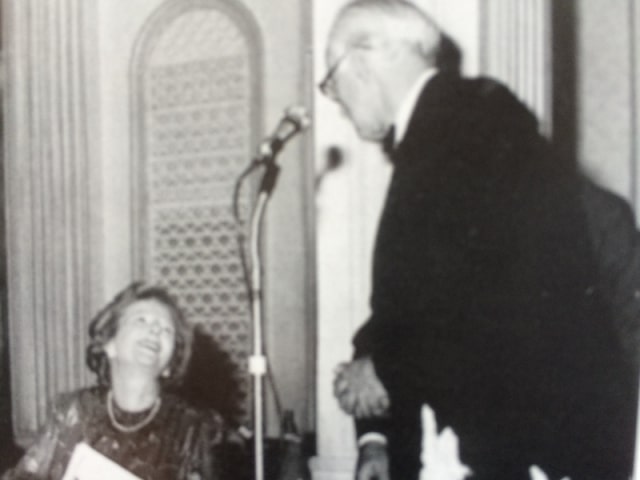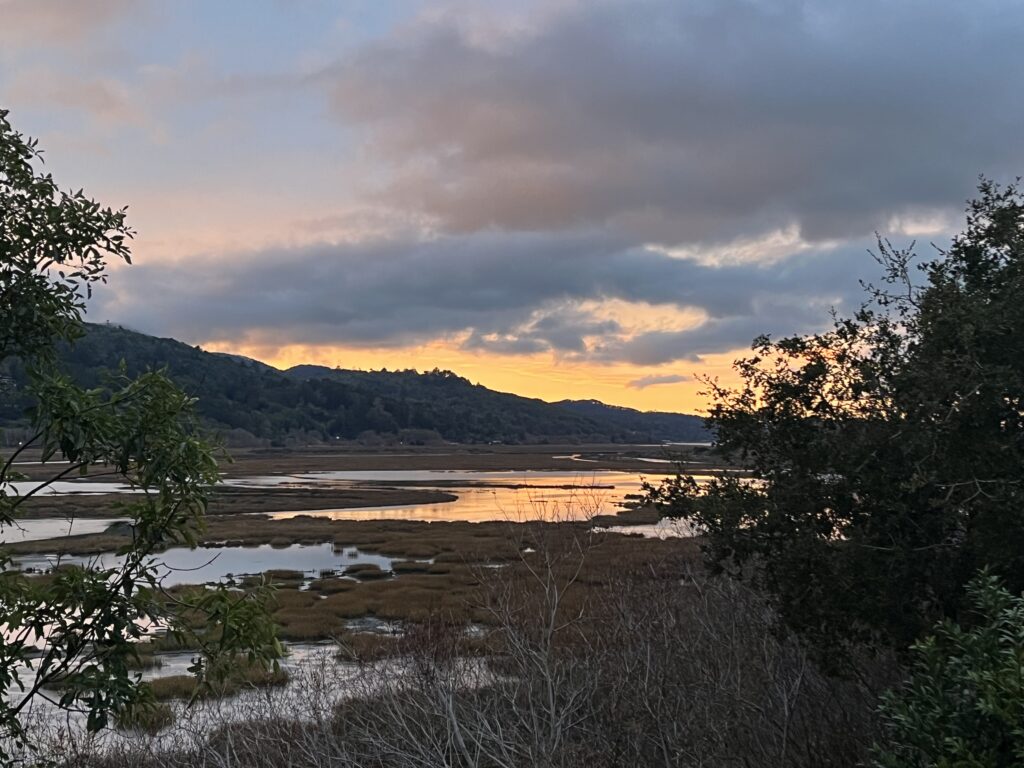A fateful meeting between economist Friedrich von Hayek and British aristocrat Antony Fisher had lasting consequences—including for the debate about climate change policy. Picture: Fisher with Margaret Thatcher.
Friedrich von Hayek was working on his latest book, The Use of Knowledge in Society, at the London School of Economics during the Summer of 1945 when, one day, there was a knock at the door.
Antony Fisher entered and introduced himself. “I share all your worries and concerns expressed in The Road to Serfdom, and I am going into politics to put them right,” he announced.
The demobbed Battle of Britain hero had been utterly spellbound by Hayek’s writings, and assumed the obscure academic would be excited and grateful to have won the support of a well-heeled aristocrat willing to fight his cause in parliament.
But Hayek had other ideas, and was not willing to compromise. The academic was keen to copy his arch political rivals, the socialist Fabians at the LSE, and shape public opinion in order to win over “thought leaders” before he would consider running for elected office.
Decisive Influence
Years later, Antony would recall: “Hayek first warned against wasting time – as I was then tempted – by taking up a political career.
“He explained his view that the decisive influence in the great battle of ideas and policy was wielded by the intellectuals, whom he characterised as ‘the second hand dealers in ideas’…his counsel was that I should join with others in forming a scholarly research organisation to supply intellectuals in universities, schools, journalism and broadcasting with authoritative studies of the economic theory of markets and its application to practical affairs.”
What Hayek was advocating, in fact, was a full-scale, ideologically driven propaganda assault on socialism in favour of the free markets. Antony was, at first, disappointed and unconvinced.
Hayek would recall: “I had considerable trouble persuading him that mass propaganda was futile and that the cast consisted rather of convincing intellectuals.
“I convinced this man by the name of Antony Fisher of the need to establish such an institution, which led to the founding of the Institute of Economic Affairs.
Peace and Prosperity
“Its progress was very slow at first, but today it is not only enormously influential, but also serves as a model for a whole set of comparable institutions scattered around the entire western half of the globe, from which sound ideas emanate.”
The discussion between Hayek and Fisher in a small office at the LSE would be easy to dismiss as simply delusional, were it not for hindsight.
The two men were discussing how to transform the common sense belief that only a planned economy stood between peace and prosperity and the grotesque horror of the Second World War, and the Great Depression that preceded it.
They wanted to change the economic programme of every government on earth, from the United States to the USSR, from Britain to Bahrain.
Hayek concluded that the only possible way of doing this was to change the ideology of the time, the prevailing ideas in society, by influencing intellectuals. He turned to industrialists and bankers to fund his ambitions.
Hayek was also, at the time of the meeting, already progressing with plans to establish his own international society of economists from the Austrian school of free market fundamentalism.
Prying Eyes
Sometime after the meeting with Fisher, a Dr Albert Hunold invited Hayek to give a talk to students in Zurich and, after the presentation, invited the economist to dinner with a group of Swiss industrialists and bankers.
Hayek told them it would be “an enormous help” if they would fund an event at which intellectuals “could come together and meet for about a week somewhere in a Swiss hotel”. Hunold was keen to support the cause, donating personally and fundraising among his wealthy associates.
On April 1 1947, Hayek arrived at Mont Pelerin, near Vevey, for a conference of Austrian school economists for a week of discussion and debate, away from the prying eyes of the press and public.
Among the guests were Ludwig von Mises, the father of the free market and Hayek’s old boss, Milton Freedman, the influential American economist, and Professor Lional Robbins, who had first hired him at the London School of Economics.
The invitation sent by Hayek appealed to “all those who have become gravely concerned about the chances of preserving a free society, and who feel that not only the whole relation between government coercion and individual freedom requires re-examination, but also that current views of recent history will have to be revised if the dominant beliefs and misconceptions are not to drive us ever further in a totalitarian direction.”
During the event, Robbins drafted the statement of aims for what would become the Mont Pelerin Society.
Enthralling and Terrifying
“The central values of civilisation are in danger. Over large stretches of the earth’s surface the essential conditions of human dignity and freedom have disappeared,” it read.
“[Our] object is solely, by facilitating the exchange of views among minds inspired by certain ideas and broad conceptions held in common, to contribute to the preservation and improvement of a free society.”
While Hayek was establishing the Mont Pelerin Society, Fisher was living in Sussex and working on his latest book, The Case for Freedom.
This short book revealed a paranoid obsession for the “enthralling if terrifying subject of communism.”
Fisher came to see Communist intrigue everywhere. The office of the American vice president had fallen to Red infiltrators.
International institutions like Bretton Woods, and even the British agricultural boards who he held responsible for the poor quality of food, had also been taken over by spies and sleeper agents.
A Big School
The solution was simple. “The free market economy and the prosperity it creates will in itself be a safeguard, for all forms of monopoly or concentration of power in the hands of a few, be they of capital or labour or ‘national’, are dangerously vulnerable to Communist penetration.”
Antony believed Britain to be an entirely benevolent, paternalistic world power, and saw its capitalist economy as the last bulwark of freedom and liberty.
The English, he argued in his book, “set out to colonise large areas of the world. Everywhere they took law and order with them and the free market system of the nineteenth century gave the process an added momentum.”
Compromise With Principle
He added: “With intelligent coloured races there always has been and will be for many years to come, the problem of a civil sense.
“We send children to school, and in just this way the British were bringing India up in a big school, bringing immeasurable advantages to all concerned.”
This version of imperialism would be hotly disputed by any academic studying colonialism, and also by the millions of people killed and exploited under the coal-fired empire.
Some psychologists may, without wanting to pathologise, detect in Fisher a terrified mind “splitting” all around him into loyal friend and shadowy foe.
“It is not possible to compromise with principle,” he argued. “There is much talk of a ‘middle way’. There surely can be only a right and wrong way.”
There was Marx and there was Hayek. Keynes, the pragmatic planner, was a compromise too far.
The agonising tragedy of war had spurred Fisher on to fight a permanent, shapeshifting enemy within that would, whenever possible, assume the position of the state, imposing taxation, regulation and limitations on the free individual as if for sport.
Coming Up: How Hayek and Fisher – funded by industry – would influence the ambitious young Margaret Thatcher and in one short decade change the course of history.
Subscribe to our newsletter
Stay up to date with DeSmog news and alerts







